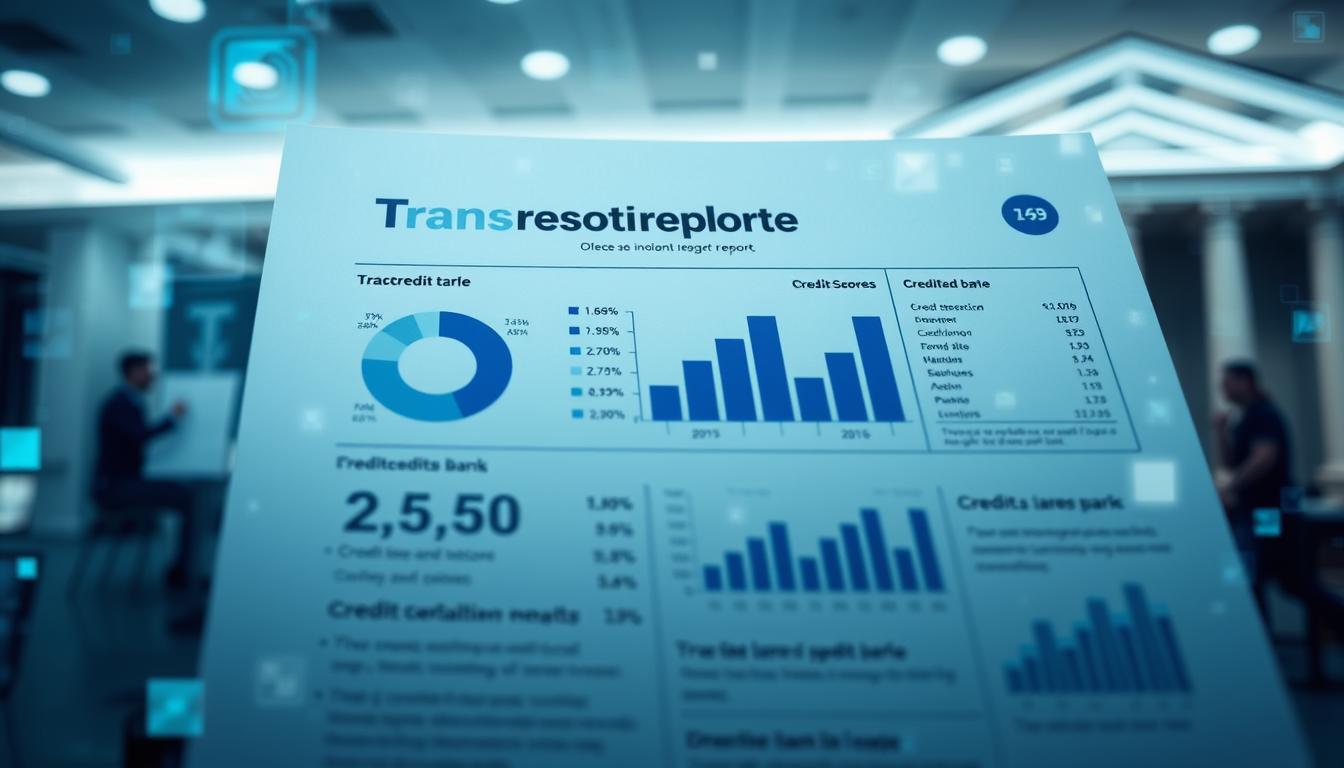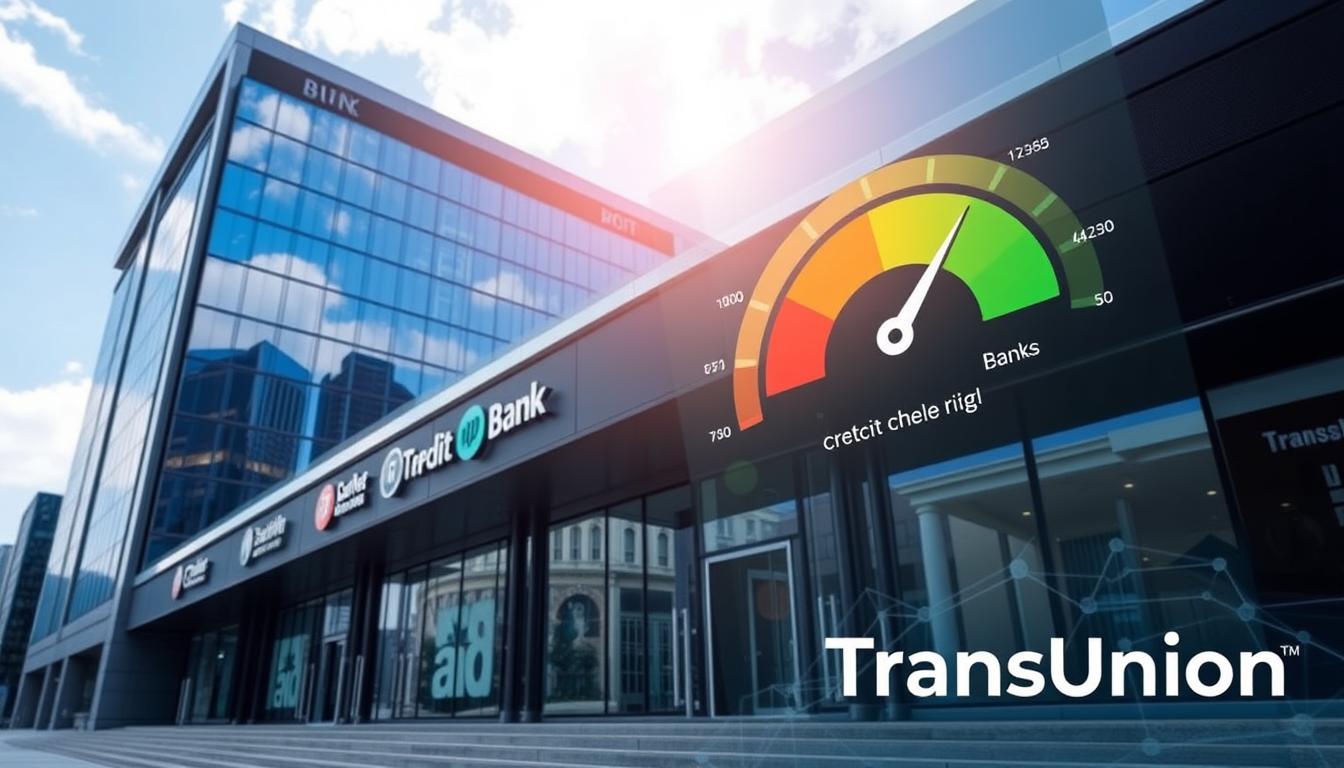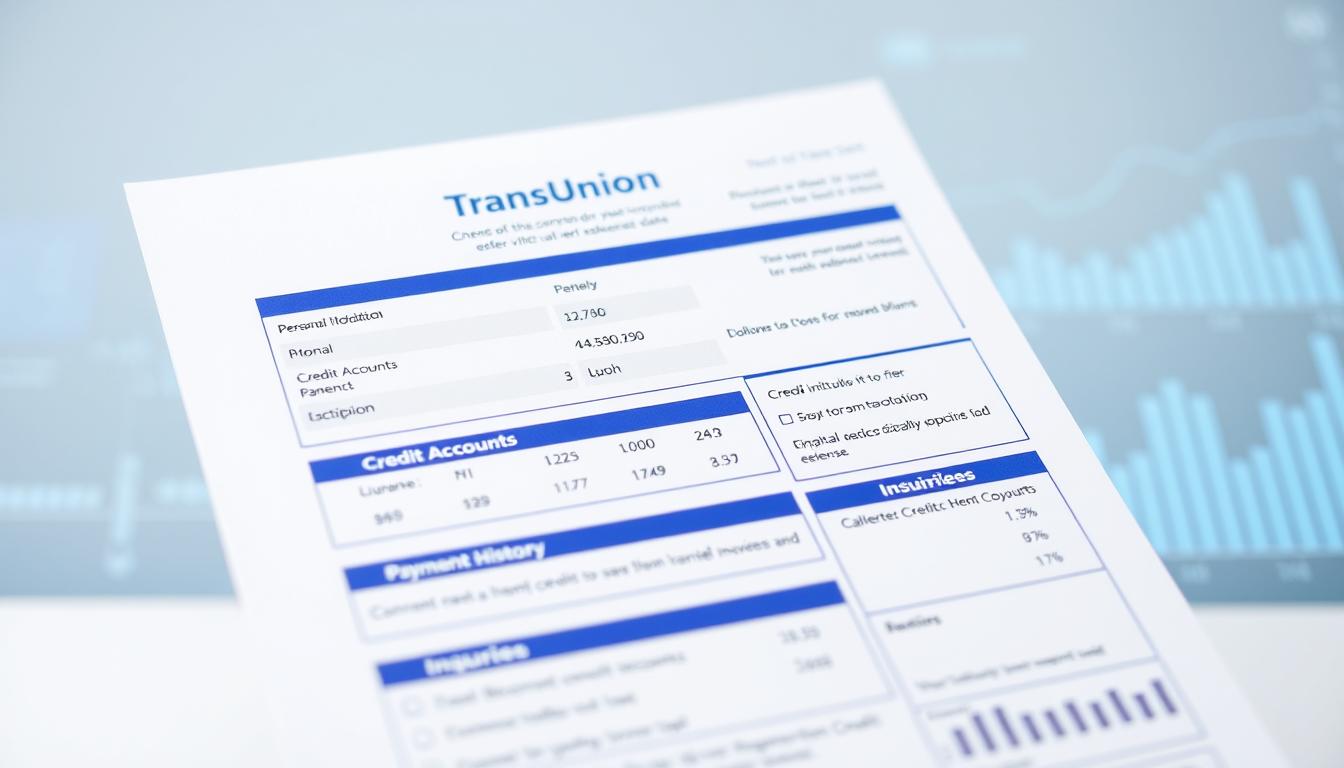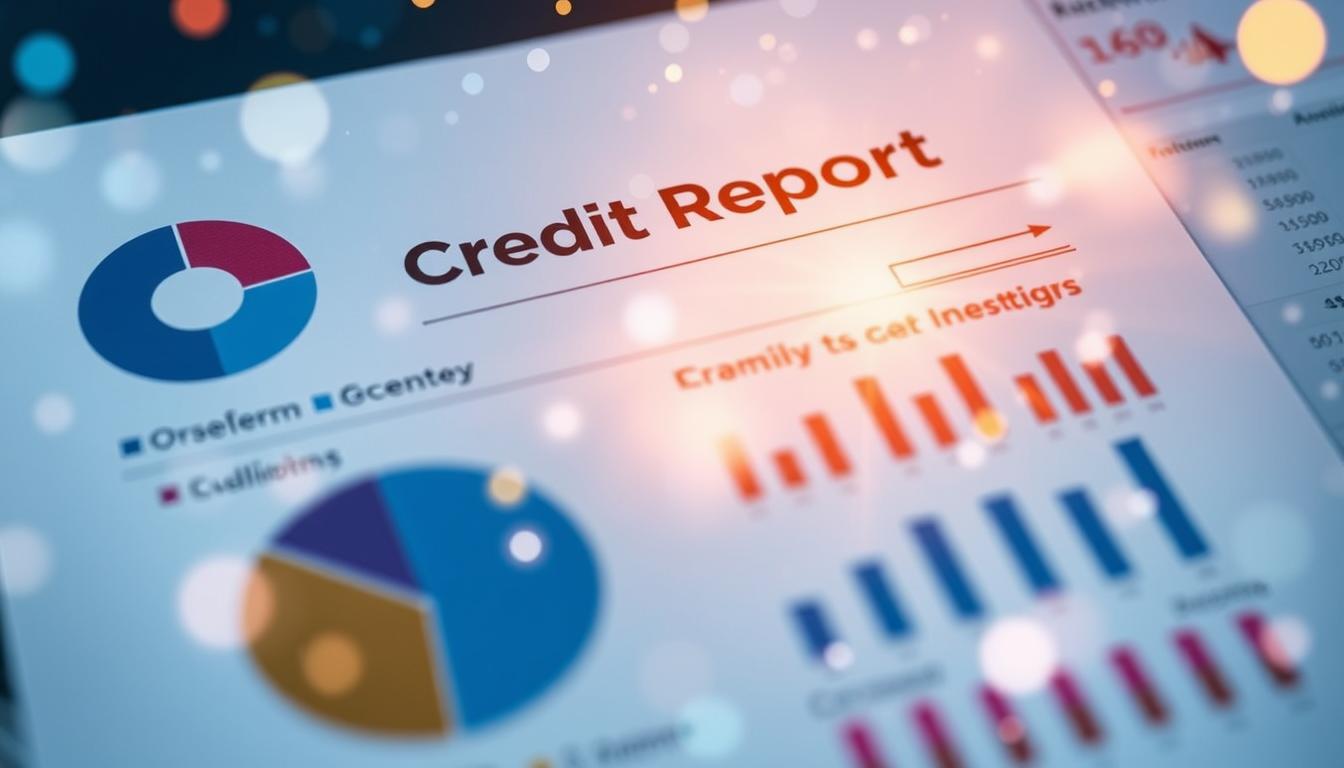Banks review your credit report when you apply for financial products. TransUnion is one of three major credit bureaus in the United States. Your TransUnion credit report influences lenders’ decisions on your credit applications.
This article explores TransUnion’s importance for banks and financial institutions. We’ll look at the information they gather from TransUnion credit reports. We’ll also discuss major banks using TransUnion data.
Understanding TransUnion’s role in banking can help you prepare for credit applications. It ensures your financial profile shines in the best light possible.
Key Takeaways
- Banks and lenders rely heavily on TransUnion credit reports when evaluating loan and credit applications.
- The information in your TransUnion report, such as your credit history, payment patterns, and credit utilization, can greatly influence a lender’s decision to approve or deny your credit request.
- Major national banks, as well as regional financial institutions, utilize TransUnion data as part of their credit underwriting and risk assessment processes.
- Understanding the types of financial products that require a TransUnion credit check can help you better prepare for the application process.
- Regularly monitoring your TransUnion credit report and addressing any errors or discrepancies can improve your creditworthiness in the eyes of lenders.
Understanding TransUnion and Its Role in Bank Credit Checks
TransUnioncredit reports> is a major credit reporting agency in the United States. It collects credit information on consumers for lenders to use. Credit bureausinstitutions credit bureaus> help banks make decisions about loans and credit.
Lenders and creditorsusage by lenders> use TransUnion’s data to set credit limits and interest rates. This information helps them assess the risk of lending to individuals.
What Is TransUnion?
TransUnion gathers data on individual credit histories. Banks and other financial institutionsunderwriting with transunion> use this information to evaluate loan applicants. The agency’s database includes details on credit accounts, payment histories, and public records.
TransUnion’s Significance for Bank Lending Decisions
Banks rely heavily on TransUnion’s data to assess borrower risk. They analyze TransUnion credit reportscredit reports> to gain insights into an applicant’s creditworthiness. This helps them make informed decisions about loans and credit terms.
“TransUnion’s data is essential for banks to make informed lending decisions that balance risk and opportunity.”
TransUnion’s information helps lendersusage by lenders> evaluate an applicant’s payment history and financial stability. This allows more accurate underwriting decisionsunderwriting with transunion>, benefiting both lenders and borrowers.

Major Banks That Use TransUnion for Credit Checks
Many top U.S. banks rely on TransUnion for credit information. This agency helps banks assess borrowers’ creditworthiness. TransUnion data is crucial for evaluating loan applications.
Major banks using TransUnion data include:
- Chase
- Bank of America
- Wells Fargo
- Citibank
- U.S. Bank
- PNC Bank
- Capital One
These major banks value TransUnion bank credit inquiries for informed lending decisions. They use TransUnion’s credit profiles to evaluate applicants’ creditworthiness.
This helps banks make better choices about extending credit to potential borrowers.
| Bank | Use of TransUnion |
|---|---|
| Chase | Primary credit report source for loan applications |
| Bank of America | Relies on TransUnion data for mortgage, personal loan, and credit card decisions |
| Wells Fargo | Utilizes TransUnion credit reports for a variety of lending products |
Understanding TransUnion’s role in bank credit checks helps consumers prepare for lending. This knowledge aids in navigating credit products from major financial institutions.

what banks pull from transunion
Banks use TransUnion credit reports to assess lending risk. They review your credit history, scores, and outstanding debts. This information helps them make decisions about loans and credit cards.
Both nationwide and regional financial institutions rely on TransUnion data. They use this information for bank credit checks and credit report reviews.
Nationwide Banks Utilizing TransUnion
Large national banks like JPMorgan Chase, Bank of America, and Wells Fargo use TransUnion bank credit inquiries. They analyze your TransUnion credit report in detail to make informed lending decisions.
Regional Banks and TransUnion Credit Reports
Smaller regional banks and credit unions also use TransUnion credit reports. They focus on specific factors like payment history and credit utilization. This helps them determine your creditworthiness.
| Bank | Utilization of TransUnion Data |
|---|---|
| JPMorgan Chase | Comprehensive review of TransUnion credit report |
| Bank of America | Reliance on TransUnion credit scores and payment history |
| Wells Fargo | Analysis of TransUnion credit utilization and public records |
| Regional Bank ABC | Focus on TransUnion credit history and debt levels |
| Credit Union XYZ | Evaluation of TransUnion credit report for loan approvals |

“TransUnion credit reports provide banks with a comprehensive view of a borrower’s creditworthiness, enabling them to make more informed lending decisions.”
Types of Credit Products Requiring TransUnion Checks
Banks use TransUnion credit reports when you apply for loans, credit cards, and mortgages. These reports show your credit history and payment record. Lenders use this info to decide if you qualify and what terms to offer.
Your credit report affects interest rates and credit limits. It also impacts the amount you can borrow. Lenders want to know if you’re likely to repay the loan.
Personal Loans and Credit Card Applications
For personal loans and credit cards, lenders check your TransUnion report. They look at your credit profile to assess risk. This helps them set interest rates and credit limits.
Your credit history plays a big role in these decisions. A good credit score can lead to better terms. Poor credit might result in higher rates or denial.
Mortgage Lending and TransUnion Credit Reports
When you apply for a mortgage, banks pull your TransUnion credit report. Your credit score is crucial for mortgage approval. It affects your interest rate and down payment requirements.
Lenders review your credit history closely for mortgages. They want to ensure you can handle long-term loan payments. Good credit can save you money over time.
| Credit Product | Why Banks Pull TransUnion |
|---|---|
| Personal Loans | To assess creditworthiness and determine loan terms |
| Credit Cards | To evaluate credit profile and set credit limit |
| Mortgages | To review credit history and determine loan eligibility |
TransUnion credit reports help banks make smart lending choices. They use these reports for credit report requests from banks. Bank credit checks are a key part of loan applications.

Understanding Bank Credit Inquiries on Your TransUnion Report
Lenders often check your transunion credit reports when you apply for financing. This check is recorded as a transunion bank credit inquiry on your report. These inquiries are part of the bank credit check process.
Hard inquiries and soft inquiries affect your credit differently. Hard inquiries can slightly lower your credit scores. They happen when lenders review your credit for an application.
Soft inquiries don’t affect your scores. They’re used for pre-approvals or account monitoring. Understanding these differences helps you manage your credit better.
| Type of Inquiry | Impact on Credit Scores | Example |
|---|---|---|
| Hard Inquiry | Slight negative impact | Applying for a loan or credit card |
| Soft Inquiry | No impact | Pre-approval or account monitoring |
Regularly check your transunion credit reports for accuracy. Make sure all bank credit checks and transunion bank credit inquiries are legitimate. This helps you make smart decisions about credit applications.
Factors Influencing TransUnion Usage by Lenders
Banks and financial institutions rely on TransUnion data to varying degrees. Their usage depends on credit scoring models, financial products, and regulatory environment. These factors shape how lenders use TransUnion information.
Credit Scoring Models and TransUnion Data
Lenders often use data from multiple credit bureaus, including TransUnion, Experian, and Equifax. Some prefer TransUnion reports based on internal risk assessments and underwriting criteria.
This preference may stem from how TransUnion’s models align with their risk appetite. It can also depend on the specific financial products they offer.
| Lender | Preferred Credit Bureau | Reason for Preference |
|---|---|---|
| Bank A | TransUnion | Aligns with their credit scoring models and underwriting for personal loans and credit cards |
| Mortgage Lender B | Experian | Provides more comprehensive data for mortgage underwriting |
| Regional Bank C | Equifax | Offers better insights into the local market and customer base |
Industry regulations and guidelines also influence the choice of credit bureau data. Lenders must comply with all applicable laws when making credit decisions.
The factors affecting a lender’s use of TransUnion data are complex. They vary based on the lender’s needs, risk strategies, and regulatory requirements.
Preparing for Bank Credit Checks with TransUnion
Banks often use TransUnion credit reports to evaluate loan applicants. It’s vital to monitor your TransUnion credit reports and fix any issues. This ensures accurate data for credit report requests from banks, boosting your chances of favorable transunion bank credit inquiries.
Monitoring Your TransUnion Credit Report
Regularly reviewing your TransUnion credit report helps spot and fix errors. These errors could harm your creditworthiness. Here are tips to manage your credit profile effectively:
- Obtain your TransUnion credit report at least once a year, either through the official AnnualCreditReport.com website or by directly contacting TransUnion.
- Carefully review your report for any inaccurate or incomplete information, such as incorrect account details, incorrect payment histories, or fraudulent activity.
- If you notice any errors, promptly dispute them with TransUnion by following their established dispute resolution process.
- Monitor your report for signs of identity theft or unauthorized transunion bank credit inquiries, and take immediate action to address any suspicious activities.
Active management of your TransUnion credit report ensures accurate representation of your financial history. This improves your chances of getting good credit terms from banks.
It also helps you secure better loan options from other lenders. Stay vigilant and address issues promptly for a healthy credit profile.
“Regularly monitoring your TransUnion credit report is an essential step in maintaining a healthy credit profile and preparing for bank credit checks.”
Disputing Errors on Your TransUnion Credit Report
An accurate transunion credit reports is vital for securing good terms from banks and lenders. You can dispute any inaccuracies directly with TransUnion. This process requires documentation to support your claim.
Fixing errors can improve your credit report checks by banks. It ensures financial institutions have correct information when evaluating your creditworthiness. By monitoring and correcting transunion bank credit inquiries, you can shape your financial future.
Steps to Dispute Errors on Your TransUnion Credit Report
- Review your TransUnion credit report thoroughly to identify any inaccuracies or errors.
- Gather supporting documentation, such as bills, statements, or other records, to substantiate your claims.
- Submit a formal dispute to TransUnion, either online, by mail, or by phone, detailing the specific errors and providing the necessary evidence.
- Wait for TransUnion to investigate the dispute and provide you with the results.
- If the errors are verified, TransUnion will correct them, and you can request a updated credit report to confirm the changes.
Ensuring accurate credit report requests from banks can boost your financial standing. It positions you better for successful transunion credit report reviews by lenders. Take charge of your credit report today.
“Maintaining a clean and accurate credit report is essential for securing the best possible terms from banks and lenders. Disputing errors on your TransUnion report is a crucial step in taking control of your financial future.”
| Key Benefits of Disputing Errors on Your TransUnion Report | Potential Consequences of Inaccurate TransUnion Data |
|---|---|
|
|
Conclusion
TransUnion plays a crucial role in credit decisions for banks and lenders. Major financial institutions use TransUnion’s reports to assess applicants’ creditworthiness. Knowing how this impacts your credit access is vital for financial health.
We’ve explored TransUnion’s importance and the banks that use its services. We’ve also looked at credit products requiring TransUnion checks and factors influencing lenders’ use of this data.
Your TransUnion credit report is a key financial tool. Stay informed and proactive to ensure your creditworthiness is accurately represented. This knowledge empowers you to make smart financial choices.
Understanding TransUnion’s role gives you an edge when applying for loans or credit cards. It helps you navigate the banking system with confidence. Use this information to achieve your financial goals effectively.

